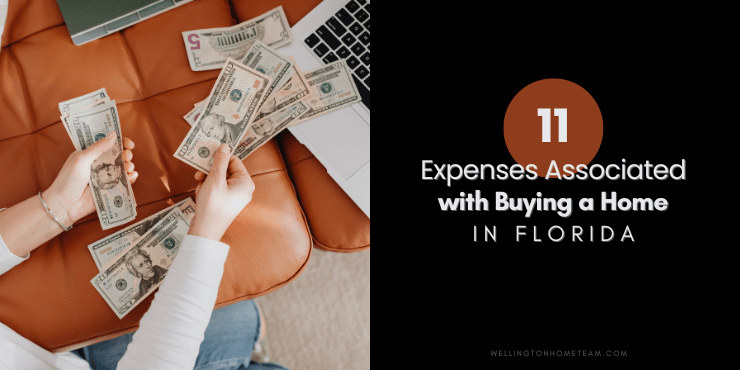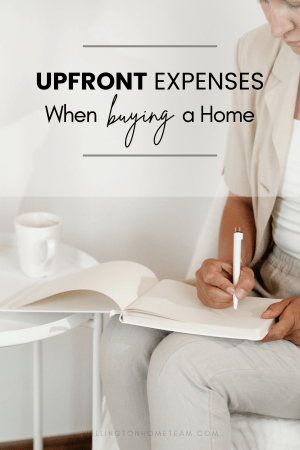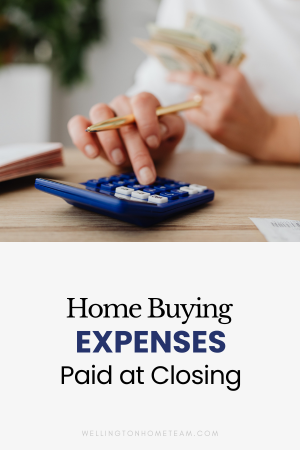11 Expenses Associated with Buying a Home in Florida
Embarking on the journey of buying a home in Florida is an exciting venture, but it’s vital for buyers to be well-informed about the various expenses that come along with it. In this comprehensive guide, we will delve into the expenses associated with purchasing a home in Florida.

So, let’s explore the financial aspects of homeownership in the Sunshine State and equip buyers with the knowledge they need to navigate this exciting chapter of their life.
Upfront Expenses
There are several upfront expenses associated with buying a home in Florida and here are the top expenses.
Escrow Deposit
The very first expense a buyer will most likely have during the home-buying process is putting down an escrow deposit, also commonly referred to as an earnest money deposit. This type of deposit will accompany an offer or be collected shortly after an offer is accepted. The escrow deposit amount and due date for these funds will be stipulated in the offer itself.
Escrow deposits are typically held by the company handling the closing, a title company, or an attorney, and it’s applied toward the buyer’s closing costs. However, the selling brokerage or listing brokerage may hold escrow as well. The average escrow deposit a buyer makes is usually between 1%-3% of the purchase price.
Home Inspection
Another expense buyers can expect to pay prior to closing is for a home inspection. While a home inspection is not required it’s highly recommended. Buyers should know about all of the major and minor repairs/replacements the home they’re purchasing will need.
Depending on the terms of the contract, sellers might have an obligation to address specific issues uncovered during the home inspection. Buyers, on the other hand, may have options such as negotiating for repairs, requesting a repair credit, or even canceling the contract during the inspection period. The specifics of these options hinge on the terms outlined in the contract.
The cost of a home inspection typically ranges from $500 to $1,000, although the final price can vary based on factors such as the home’s size, location, and the scope of the inspection. Additionally, if the buyer is considering extra inspections like mold, sewer, WDO (wood destroying organisms), or a 4-point inspection, these can add to the overall cost.
Home Appraisal If a buyer is obtaining a mortgage they’ll most likely need to pay for a home appraisal up front. However, if a buyer is paying cash an appraisal will be optional. The cost of a home appraisal varies, it really depends on the complexity and location of the property, but the average appraisal costs $500-$750.
If a buyer is obtaining a mortgage they’ll most likely need to pay for a home appraisal up front. However, if a buyer is paying cash an appraisal will be optional. The cost of a home appraisal varies, it really depends on the complexity and location of the property, but the average appraisal costs $500-$750.
When a buyer is obtaining a mortgage, they will typically need to cover the upfront cost of a home appraisal. However, for buyers making a cash purchase, an appraisal is generally considered optional. The price of a home appraisal can fluctuate, primarily based on factors like the property’s complexity, location, and the type of loan. On average, a buyer can expect the cost of an appraisal to range from $500 to $750.
Survey
Financed buyers should anticipate an additional expense before closing, which is the cost of a property survey. This survey serves to verify if the home complies with zoning regulations and ensures that neighbors have not infringed on the property with features like pools, fences, playsets, or other structures. Similar to a home appraisal, a survey is not mandatory for cash buyers, but it remains an available option. The expenses associated with an appraisal usually range between $500 to $1,000 but ultimately depend on the size and location of the property.
Homeowners Insurance
Unless a buyer is paying cash for their new home they will need to purchase homeowners insurance prior to closing. Some insurance agencies will require payment prior to closing while others will accept it at closing.
While a cash buyer doesn’t have to obtain homeowner insurance it’s highly recommended. The cost of homeowners insurance and additional expenses associated with the policy will vary greatly throughout Florida and it’s important for buyers to understand what they’re purchasing. Are they fully insured? Do they need flood insurance? What is their deductible?
Expenses Paid at Closing
There are also several expenses associated with buying a home in Florida that are paid at closing and here are those top expenses.
Down Payment
A significant portion of a buyer’s closing costs can be attributed to their down payment, and the specific amount can vary considerably based on their financial situation and the type of loan they’re using. Traditionally, many buyers aim to put down a substantial 20% of the property’s purchase price as their down payment.
However, not all buyers have the means to provide such a sizable down payment. Some opt for more modest down payments, such as 3% of the home’s purchase price, which can be especially common for first-time homebuyers. Additionally, there are specialized programs like VA loans that offer eligible veterans and service members the opportunity to purchase a home with a 0% down payment.
Lending Fees
When a buyer is obtaining a mortgage, it’s important to be aware of the various expenses associated with this financial transaction. These fees, which can vary depending on the lender and specific circumstances, play a significant role in the overall cost of securing a mortgage.
Common fees encountered by mortgage applicants typically encompass charges such as an application fee, credit fee, processing fee, and/or origination fee. These fees can be in the hundreds or in the thousands depending on the lender. In addition to these lender-associated fees, there are also state fees that must be paid, and these are usually non-negotiable charges that contribute to the overall cost of securing a mortgage in Florida.
Another important aspect of mortgage transactions pertains to the concept of “escrow.” In cases where the lender is responsible for collecting and paying the buyer’s property tax and homeowners insurance bills, they will often require the borrower to contribute funds at the closing. These funds are held in an escrow account and are subsequently used to cover these recurring expenses as they become due, ensuring that the buyer remains current on these financial obligations.
 Title Fees and Searches
Title Fees and Searches
A title search is a careful check to make sure no one else has a valid claim or debt on the house you want to buy. It’s done to ensure that the property’s ownership is clear and there are no hidden problems with the title.
This involves reviewing public records like deeds and mortgages to confirm who owns the property and if there are any unresolved legal issues related to it. In simple terms, a title search is an important step when buying a home to make sure you’re getting a property without any legal troubles or debts attached to it.
Closing Company Fees
The company responsible for overseeing the closing, typically a title company or a real estate attorney, will assess escrow fees or settlement fees. Their role is to ensure that all the state’s legal requirements are adhered to during the closing process, and they typically charge $500 to $1,000 for their services.
HOA Fees
When buying a home in a homeowners association (HOA), buyers should be aware of the expenses associated that may come along with it. Feeds tend to include pro-rated HOA fees, an application fee, and a capital contribution. Pro-rated HOA fees cover a portion of the annual or monthly dues that all homeowners pay for maintaining shared areas. An application fee, which might be collected prior to closing, helps with processing new residents, while a capital contribution is a one-time payment to support the HOA’s financial stability.
Moving Costs
Another financial aspect to consider when purchasing a home in Florida is the expenses associated with moving. Regardless of whether the relocation is nearby or at a distance, it comes with associated costs. Even if a buyer opts for a do-it-yourself move, such as renting a truck and handling the packing and transportation independently, expenses still accumulate. These costs can include rental fees for moving vehicles, packing supplies like boxes and tape, fuel costs, and any potential assistance hired for heavy lifting or loading.
For those planning longer-distance moves, additional considerations may involve overnight accommodations, meals, and other incidentals during the journey. Therefore, it’s important for homebuyers to include moving expenses in their budgeting when planning their transition to a new home in Florida.
Ongoing Expenses
After buying a home in Florida, there are ongoing expenses associated with owning a home that buyers need to consider, such as:
- Mortgage payments
- Property taxes
- HOA fees
- Homeowners and mortgage insurance
- Home maintenance and repairs
- Utilities
Final Thoughts
Buying a home in Florida entails a range of expenses that go beyond the initial purchase price. By understanding the key expenses associated with purchasing a home, buyers can make informed financial decisions. From closing costs and property taxes to insurance and ongoing maintenance, being prepared for these financial responsibilities will help buyers navigate the world of homeownership successfully.
Please consider spreading the word and sharing; 11 Expenses Associated with Buying a Home in Florida
About the Author
Top Wellington Realtor, Michelle Gibson, wrote: “11 Expenses Associated with Buying a Home in Florida”
Michelle has been specializing in residential real estate since 2001 throughout Wellington Florida and the surrounding area. Whether you’re looking to buy, sell or rent she will guide you through the entire real estate transaction. If you’re ready to put Michelle’s knowledge and expertise to work for you call or e-mail her today.
Areas of service include Wellington, Lake Worth, Royal Palm Beach, Boynton Beach, West Palm Beach, Loxahatchee, Greenacres, and more.
11 Expenses Associated with Buying a Home in Florida
- SEO Powered Content & PR Distribution. Get Amplified Today.
- PlatoData.Network Vertical Generative Ai. Empower Yourself. Access Here.
- PlatoAiStream. Web3 Intelligence. Knowledge Amplified. Access Here.
- PlatoESG. Carbon, CleanTech, Energy, Environment, Solar, Waste Management. Access Here.
- PlatoHealth. Biotech and Clinical Trials Intelligence. Access Here.
- Source: https://wellingtonhometeam.com/hidden-costs-to-buying-a-home-in-florida/



